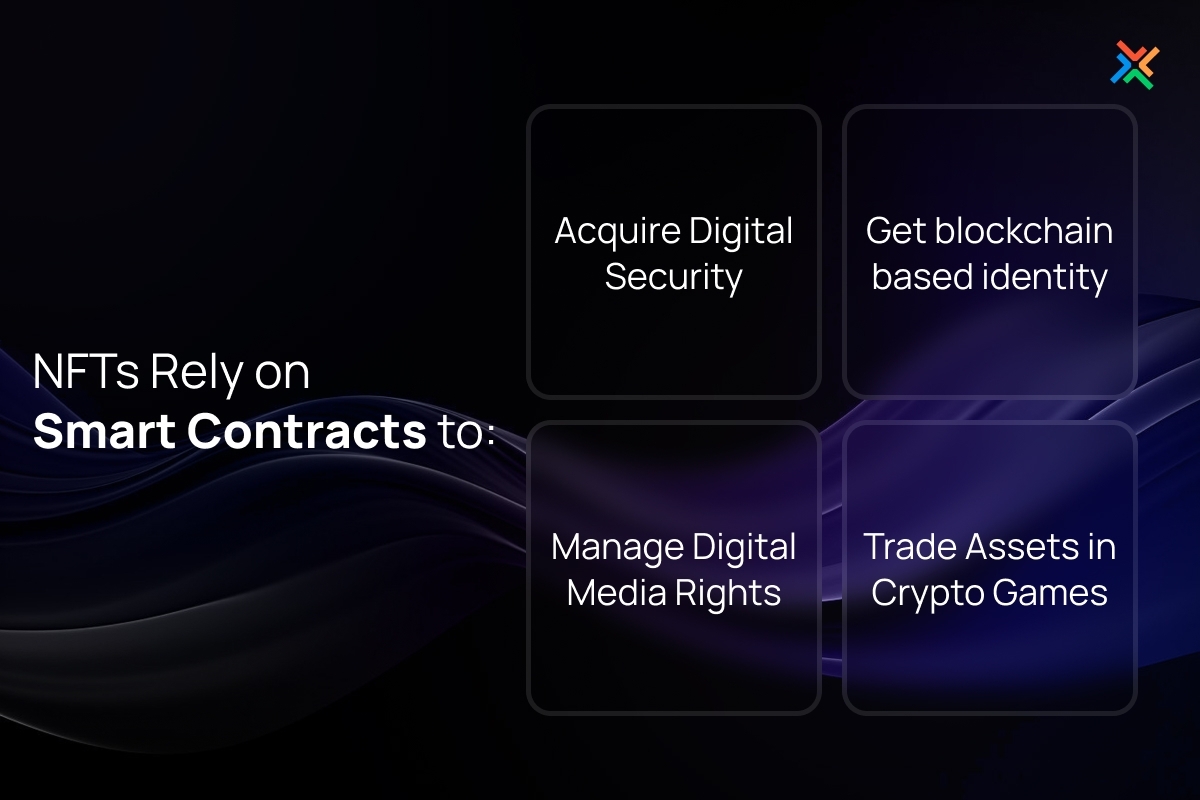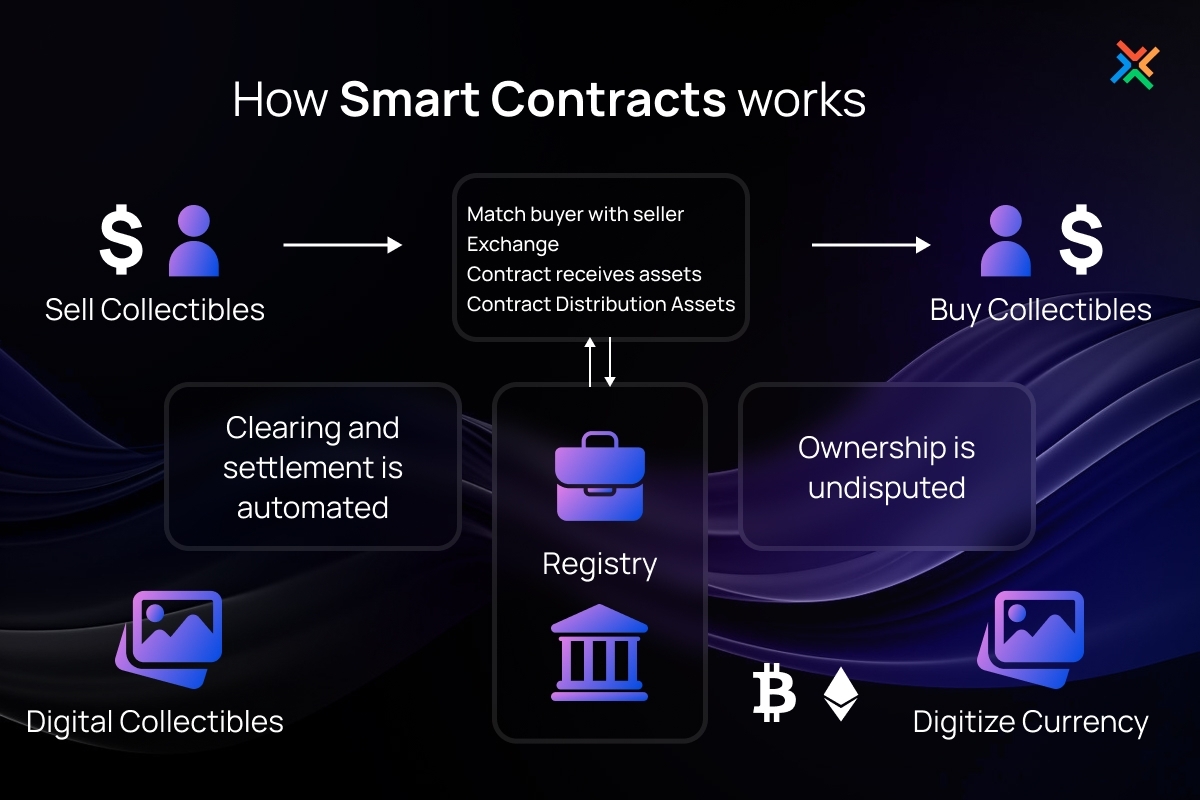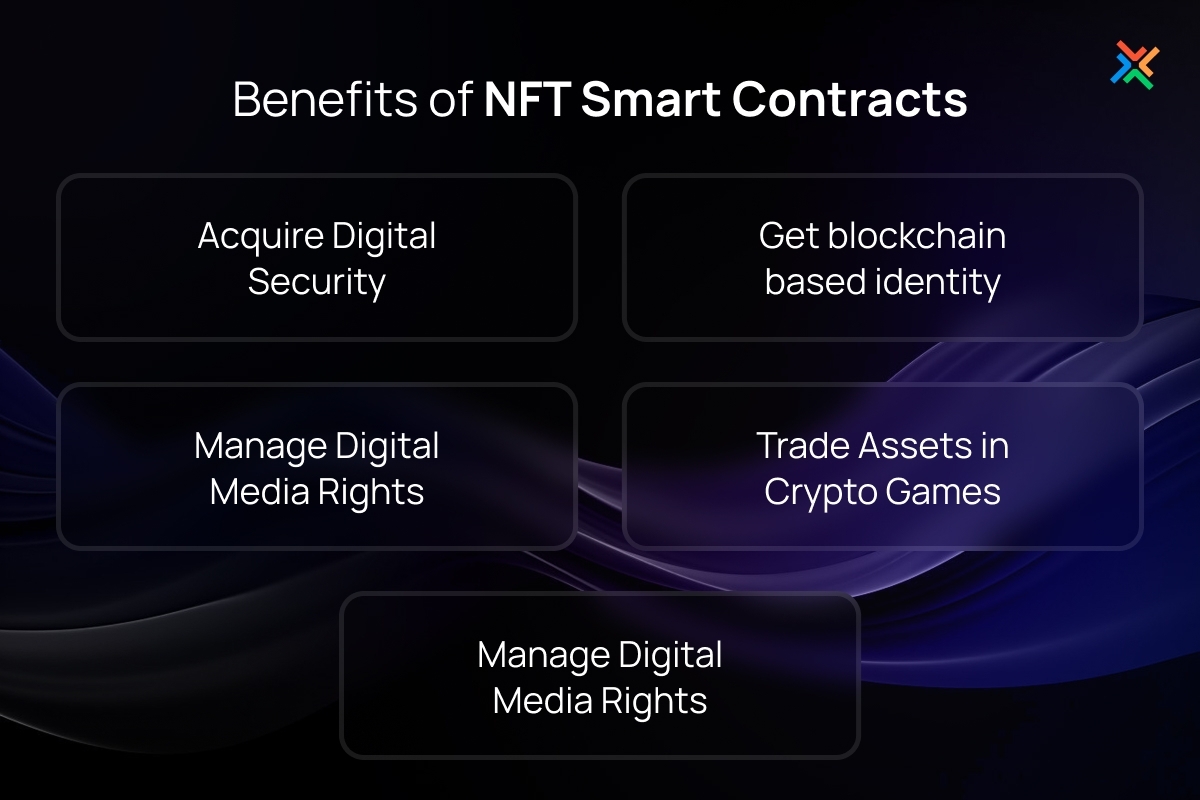The Role of Smart Contracts in NFT Development: A Complete Overview
September 26, 2024

Ayush Kanodia
.jpg?w=1920&q=75)
Non-fungible tokens (NFTs) are unique cryptographic tokens built on blockchain. These novel digital assets represent ownership of real-world or digital items, ranging from artwork and collectibles to virtual real estate and game items.
Smart contracts, which are self-executing contracts with terms directly written into code, play a pivotal role in the development of NFTs. These contracts automate the processes involved in creating, buying, selling, and transferring NFTs. They also enable programmable royalties, allowing creators to earn a percentage of each subsequent sale of their work, a feature that has attracted many artists and creators to the NFT space. Essentially, smart contracts eliminate the need for intermediaries, thereby facilitating secure transactions and providing greater control to NFT owners.

WDCS is a leading provider of NFT development services in the UAE, dedicated to helping businesses and individuals tap into the potential of this emerging technology. With a team of experienced developers and a deep understanding of blockchain technology, we offer comprehensive solutions that cater to diverse needs. Whether you're an artist looking to tokenize your work or a business seeking to create unique digital assets, we have the expertise to guide you through the process.
Technical Foundations of Smart Contracts
Smart contracts are built on top of blockchain technology that provides a decentralized and secure environment for their operation. Utilizing blockchain makes it nearly impossible to alter or tamper with data. In the context of smart contracts, blockchain facilitates trust among parties by automating and verifying transactions without the need for intermediaries.
Smart Contract Architecture
Smart contracts consist of several key components that work together to execute predefined agreements.
- Code: The core logic of the smart contract is written in programming languages and defines the rules and conditions under which the contract operates. This code dictates how the contract behaves and what actions it will perform.
- Execution Environment: Smart contracts run on a blockchain's virtual machine, such as the Ethereum Virtual Machine (EVM). This environment interprets the code and executes the contract's functions when triggered by specific events or transactions.
- Storage: Smart contracts store data on the blockchain, which includes the contract's state, variables, and any relevant information needed for execution. This data is immutable, meaning it cannot be changed once written, providing a reliable record of all transactions.
Programming Languages
Several programming languages are commonly used for smart contract development in blockchain, with Solidity and Vyper being the most prominent in the Ethereum ecosystem.
- Solidity: This is the most widely used language for writing smart contracts on the Ethereum platform. Its syntax is similar to JavaScript, making it accessible for developers familiar with web development. Solidity allows for the creation of complex contracts and supports features like inheritance and libraries.
- Vyper: Designed to be a simpler and more secure alternative to Solidity, Vyper focuses on readability and security. Its syntax is more restrictive, which helps prevent common programming errors and vulnerabilities. Vyper is particularly useful for projects that prioritize security and simplicity.
Creating NFTs with Smart Contracts

Minting NFTs
The process of creating an NFT is known as minting. This involves converting a digital asset into a unique token on the blockchain. When an NFT is minted, a smart contract is deployed that contains the rules and attributes of the token. The minting process typically involves uploading the digital asset, such as an image, video, or audio file, along with its associated metadata. The smart contract then generates a unique token ID that distinguishes this NFT from others. Once minted, the NFT is recorded on the blockchain, making it publicly verifiable and traceable.
Smart contracts play a crucial role in this process by automating the minting procedure. They make sure that the NFT is created according to the specified parameters, such as ownership rights and royalties for future sales. This automation reduces the potential for errors and minimizes the need for manual intervention.
Metadata Management
Metadata is essential for NFTs as it provides information about the digital asset, including its title, description, creator, and unique attributes. Smart contracts manage this metadata by linking it to the NFT on the blockchain. Each NFT contains a reference to its metadata, which is often stored off-chain to save space on the blockchain. This metadata can include various attributes, such as the asset's history, ownership records, and any specific traits that make it unique.
The management of metadata through smart contracts allows for detailed tracking of an NFT’s provenance, which is critical for establishing authenticity and value. Buyers can verify the history of an NFT, including previous owners and any changes made to the asset, thus encouraging trust in the market.
Ownership Transfer
Ownership transfer of NFTs is facilitated by smart contracts, which automate the process of buying, selling, and trading tokens. When an NFT is sold, the smart contract executes the transfer by updating the ownership information on the blockchain. This process involves the buyer sending cryptocurrency to the seller, and the smart contract then verifies the transaction before transferring the NFT to the buyer’s wallet.
The blockchain plays a vital role in this transfer by providing a transparent and immutable record of ownership. Each transaction is recorded in a way that is publicly accessible, allowing anyone to verify the current owner of an NFT. This transparency helps to prevent fraud and disputes over ownership, making the NFT market more secure for all participants.
Key Smart Contract Features for NFT Development
ERC-721 Standard
The Ethereum Request for Comment (ERC) 721 standard is the most widely used standard by NFT development companies in the UAE. It defines a set of rules and guidelines for creating and managing NFTs. This facilitates interoperability between different NFT projects.
Here are the key features of the ERC-721 standard.
- Unique Identifiers: Each token created under this standard has a distinct identifier, allowing for the creation of individual digital assets that can be owned and traded separately.
- Metadata Storage: ERC-721 supports the storage of metadata, which includes important information about the token, such as its title, description, and attributes. This metadata is crucial for buyers and sellers to understand the value and characteristics of the NFT.
- Ownership Transfer: The standard facilitates safe transfers of NFTs between users, ensuring that ownership changes are securely recorded on the blockchain.
- Event Logging: ERC-721 includes event logging capabilities, which track significant actions related to NFTs, such as transfers and minting. This feature helps maintain a transparent history of the asset's lifecycle.
Other Relevant Standards
In addition to ERC-721, there are other standards that cater to different needs in the NFT space. One notable example is ERC-1155, a multi-token standard that allows for the creation of both fungible and non-fungible tokens within a single contract.
Notable features of ERC-1155 include the following.
- Multiple Token Types: This standard facilitates the management of various token types in one contract, simplifying the deployment process for developers.
- Reduced Transaction Fees: By allowing multiple tokens to be handled within a single contract, ERC-1155 reduces the transaction fees associated with deploying multiple ERC-721 contracts.
- Batch Transfers: ERC-1155 supports batch transfers of tokens, which allows for efficient transactions involving multiple items in one call. This feature is particularly useful for applications such as gaming, where users may need to transfer several assets at once.
- Flexible Token Management: The standard is designed for complex applications, which makes it suitable for projects that require a mix of fungible and non-fungible tokens.
Customizable Smart Contracts
One of the primary advantages of smart contracts in NFT development is their flexibility. Developers can create customizable smart contracts that allow for the incorporation of unique features, such as special royalty structures, access controls, and unique minting processes.
The ability to modify smart contracts means that NFT projects can differentiate themselves in a crowded market. For instance, creators can implement features that allow for dynamic attributes, where the characteristics of an NFT can change based on certain conditions, or introduce gamification elements that increase user engagement.
This flexibility in smart contract design not only fosters creativity but also caters to the diverse requirements of various NFT projects, from digital art to gaming and beyond.

Advanced Features and Use Cases
Fractionalization
Fractionalization allows multiple individuals to share ownership of a single asset. Smart contracts facilitate this process by creating fungible tokens that represent a fraction of the original NFT. For example, an expensive digital artwork can be divided into several shares, making it accessible to a broader audience. Each owner holds a percentage of the NFT, which allows them to participate in its appreciation in value and any potential profits from future sales. This model democratizes access to high-value assets and encourages collective ownership, making it easier for people to invest in unique digital items.
Gaming and Virtual Worlds
The integration of NFTs and smart contracts in gaming and virtual worlds has created new possibilities for in-game items and economies. Players can own unique digital assets, such as skins, weapons, and virtual real estate, which are represented as NFTs. Smart contracts govern the creation, trading, and ownership of these items, allowing players to buy, sell, or trade them securely within the game or on external marketplaces.
In virtual worlds, NFTs can represent land, buildings, or other assets, giving players true ownership of their creations. This ownership can lead to the development of player-driven economies where users can monetize their in-game assets. Smart contracts facilitate transactions and enforce rules, creating a fair and transparent gaming experience.
Collectibles and Art
Smart contracts have impacted the art and collectibles market by providing authenticity and provenance for digital assets. Artists can mint their work as NFTs, embedding ownership details and transaction history directly into the token. This feature helps verify the authenticity of digital art, addressing concerns about forgery and duplication.
Collectors benefit from the transparency provided by smart contracts, as they can trace the ownership history of an NFT and confirm its legitimacy. Additionally, smart contracts can be programmed to allocate royalties to artists on secondary sales. This allows creators to continue earning from their work even after the initial sale. This model establishes a more sustainable ecosystem for artists and collectors alike.
Real Estate and Property
Within the real estate sector, NFTs and smart contracts can trade physical assets such as properties and land. By minting real estate assets as NFTs, ownership can be easily transferred and recorded on the blockchain. Smart contracts automate the buying and selling process, optimizing transactions and reducing the need for intermediaries.
This approach can simplify property transactions by providing a clear and immutable record of ownership, making it easier to verify titles and reduce fraud. Furthermore, fractional ownership of real estate can be achieved through NFTs, allowing multiple investors to share ownership of a property. This model opens up investment opportunities for individuals who may not have the capital to purchase entire properties on their own. Overall, the integration of NFTs and smart contracts in real estate offers a more efficient and transparent way to manage property ownership and transactions.
Case Studies: Successful NFT Projects Powered by Smart Contracts
CryptoPunks
CryptoPunks is one of the several NFT projects that have successfully utilized smart contracts to create unique digital assets and establish vibrant communities. It consists of 10,000 unique 24x24 pixel art characters. Launched in 2017, CryptoPunks was one of the first NFT projects on the Ethereum blockchain, showcasing the potential of NFTs. Each character is stored directly on the blockchain, allowing owners to buy, sell, and trade them freely. The project has become a cultural phenomenon, with some characters selling for millions of dollars.
CryptoKitties
CryptoKitties was another one of the earliest and most successful NFT projects, launching in 2017. The project used smart contracts to create unique, collectible digital kittens that could be bred, traded, and collected. The popularity of CryptoKitties helped to introduce the concept of NFTs to a wider audience and demonstrated the potential of smart contracts in creating digital assets.
Bored Ape Yacht Club (BAYC)
Bored Ape Yacht Club (BAYC) features a collection of 10,000 unique apes, each with distinct traits and attributes. Owners of these NFTs gain access to exclusive events, merchandise, and a community of fellow collectors. The smart contracts governing BAYC not only handle ownership transfers but also include features for royalties on secondary sales, which benefit the creators with ongoing revenue.
NBA Top Shot
NBA Top Shot also utilized smart contracts to create digital collectibles based on NBA highlights. The project's success has shown how NFTs can be used to create new and exciting ways for fans to engage with their favorite sports teams and players.
Challenges and Considerations
Technical Limitations
While smart contracts offer numerous advantages, there are technical challenges that developers must navigate. One significant issue is scalability. As the number of users and transactions on a blockchain increases, the network can become congested. This congestion can lead to slower transaction times and increased costs. For example, during periods of high demand, Ethereum gas fees can rise dramatically, making it expensive to mint or transfer NFTs. Developers need to consider these factors when designing smart contracts, as they can impact user experience and overall project viability.
Another technical limitation is the complexity of smart contract code. Writing efficient and secure smart contracts requires a deep understanding of programming and blockchain technology. Poorly written contracts can lead to performance issues or vulnerabilities that can be exploited.
Legal and Regulatory Issues
The legal landscape frameworks NFTs and smart contracts are still under development. Issues related to intellectual property rights are particularly complex. Artists and creators must understand how copyright laws apply to their digital assets. For instance, when an NFT is sold, the ownership of the token does not automatically transfer copyright unless explicitly stated in the smart contract. This ambiguity can lead to disputes over rights and usage.
Furthermore, regulatory compliance is a growing concern. Different jurisdictions have varying laws regarding digital assets, and compliance can be challenging for NFT projects that operate globally. Developers and businesses must stay informed about the regulatory environment to avoid potential legal pitfalls.
Security Risks
Security is a critical consideration in smart contract development. Common vulnerabilities, such as reentrancy attacks, integer overflows, and improper access control, can lead to considerable financial losses. The decentralized nature of blockchain means that once a smart contract is deployed, it cannot be easily altered or corrected if a vulnerability is discovered.
Thorough testing and auditing of smart contracts are essential to eliminate these risks. Developers should implement best practices, such as using established libraries and frameworks, conducting code reviews, and engaging third-party auditors to identify potential vulnerabilities before deployment. By prioritizing security, developers can help protect their projects and users from potential threats.
WDCS Technology's Approach to Smart Contract NFT Development
Customized Solutions
At WDCS Technology, we are a trusted NFT development company in the UAE that understands that every NFT project is unique. That's why we offer customized solutions devised for your specific requirements and industry. Whether you're an artist, a business, or a gaming studio, we can help you create NFTs that meet your goals.
Innovative Technologies
Our expertise lies in utilizing state-of-the-art technologies to create efficient NFT solutions. We utilize blockchain and smart contracts to develop secure and efficient NFT platforms. Our team is skilled in implementing decentralized storage solutions, which help maintain the integrity and availability of digital assets. By integrating advanced technologies, we can offer features such as automated royalty distribution, secure ownership verification, and transparent transaction histories. This commitment to innovation allows us to create NFT projects that stand out in the competitive market.
Security and Compliance
Security is a top priority in our NFT development process. We adhere to best practices in coding and conduct thorough audits of our smart contracts to identify and mitigate potential vulnerabilities. Our team is well-versed in the latest security protocols, protecting user data and transaction histories against unauthorized access. Additionally, we stay informed about the evolving regulatory frameworks surrounding NFTs and smart contracts. This awareness allows us to guide our clients in achieving compliance with relevant laws.
Final Takeaway
Looking ahead, we can expect improvements in scalability and efficiency that will make NFT transactions more accessible and cost-effective. Layer 2 solutions are being developed to address high gas fees and slow transaction times.
The integration of artificial intelligence (AI) with smart contracts could lead to more complex decision-making processes within contracts. This allows for dynamic adjustments based on real-time data. This could open up innovative applications in various industries.
Interoperability between different blockchain networks will become increasingly important, facilitating NFTs to move effectively across platforms and creating a more unified ecosystem for digital assets.
If you're interested in learning more about NFTs or exploring the possibilities of creating your own digital assets, WDCS Technology is here to help. Our team of experts can guide you through the process and provide the support you need to succeed.
Contact us today to discuss your NFT development needs.
Partner with our team of NFT smart contract specialists at WDCS to create innovative projects.
Join forces with a trusted NFT development company that specializes in smart contract technology. WDCS offers comprehensive solutions us to build secure, scalable, and customizable NFT solutions.